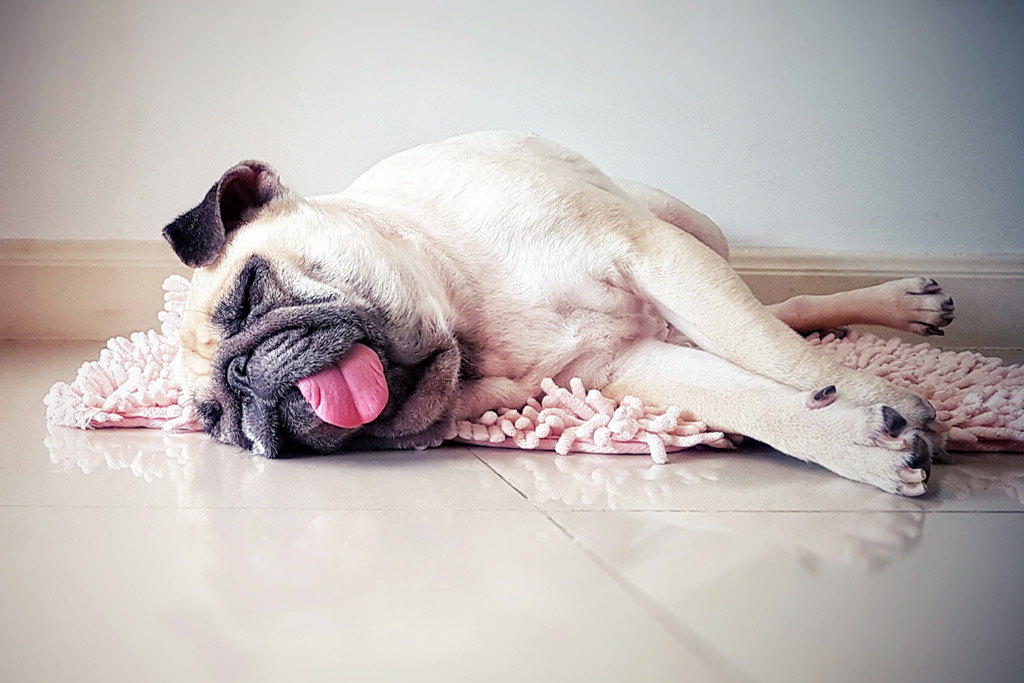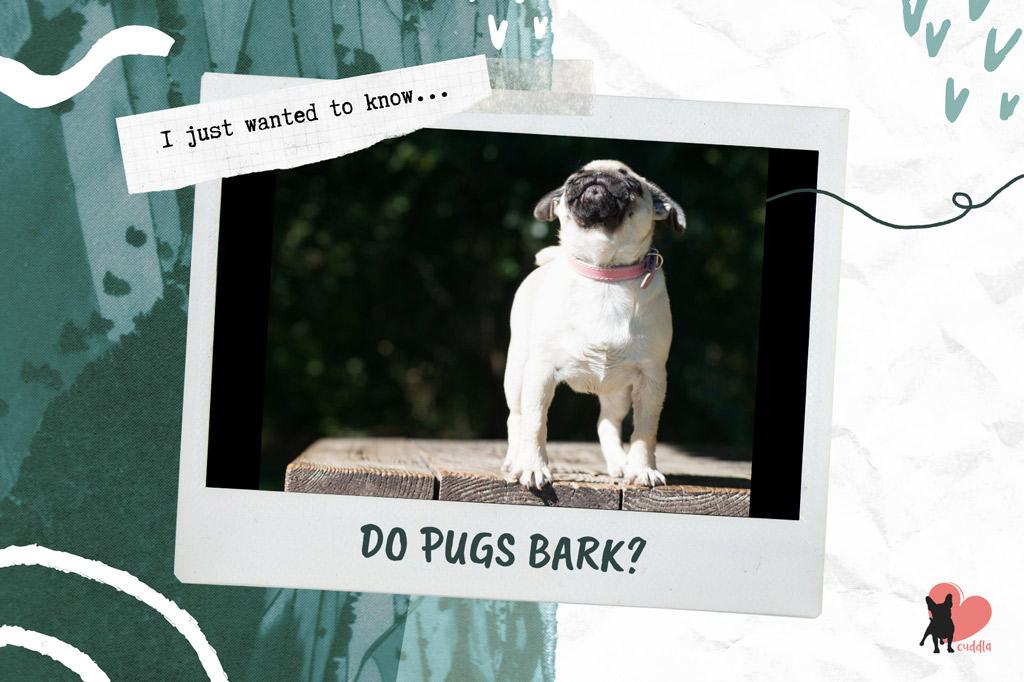
Some dogs are very vocal, like Huskies. Others, you wonder if they even bark at all! Here I answer the question – Do Pugs bark?
Pugs tendency to bark and howl is low, which makes them a quiet breed. Apart from an occasional warning or playful bark, Pugs make other noises like snorts, squeaks and grunts.
Let’s have a look at when and why Pugs bark, and their “noise repertoire”.
Do Pugs Bark?
Pugs are generally very quiet dogs, so don’t be surprised that you hardly hear them bark at all!
Don’t get me wrong, Pugs can bark and they will occasionally do so. When Pugs bark, they sound like any other small dog to me. But, don’t take my word for it; see the video below 😉
The fact that Pugs don’t bark much makes them an ideal breed if you live in an apartment or have roommates.
When I had Tootsie, she only barked a couple of times to say hello to the neighbour’s dog. She was in the garden, and heard him bark and decided to say hi, and that was about it!
When Do Pugs Start to Bark?
Pug puppies start to bark when they are 2 to 4 weeks old, during the Transitional Stage. This is right after puppies open their eyes and start to move.
As I mentioned, Pugs are quiet dogs and some will be more communicative than others. You will get a better insight into your Pug’s personality while he grows up and discover if your Pug barks or not.
Read also: When Are Pugs Full Grown? [Growth Chart Included] – for a Pug’s growing stages.
How Does Pug Barking Sound Like?
Here’s an example of adult Pugs barking.
Do Black Pugs Bark?
Black Pugs bark the same as fawn Pugs. A Pug’s colour won’t determine how much they bark, rather, this will depend on the Pug’s temperament and personality.
Continue reading to know when a Pug is likely to bark and why.
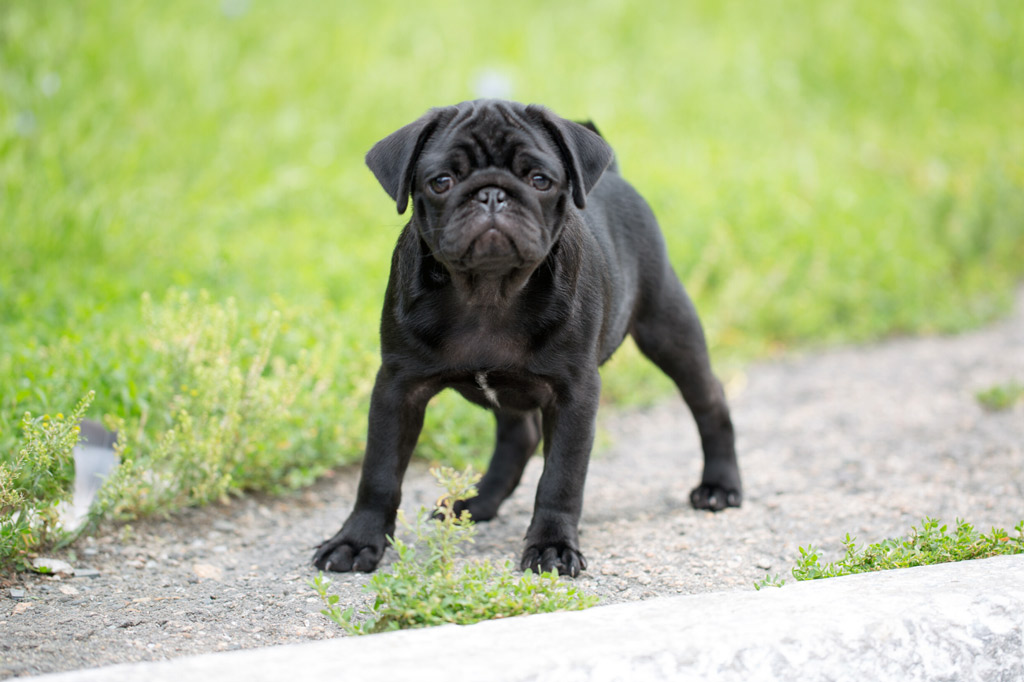
When Do Pugs Bark?
You can find your Pug barking in a number of different occasions like:
- When left alone.
- Pugs may bark if another dog is barking or they hear a barking noise coming from the TV.
- When they are happy.
- To get your attention or make a request, like wanting to go out or get some food.
- Pugs can bark at noises like the vacuum cleaner or the lawnmower. (Tootsie was so familiar with the noises inside the home and outdoors that they didn’t bother her at all!)
- When the bell rings or someone knocks on the door.
Now, let’s talk about why your Pug may choose to bark.
“When looking for a permanent solution, keep in mind that it is important for you, as the dog’s owner, to find the source of the behaviour. If your dog is barking because of boredom, providing your pet with something to do may be the answer.”
AKC, the American Kennel Club (source).
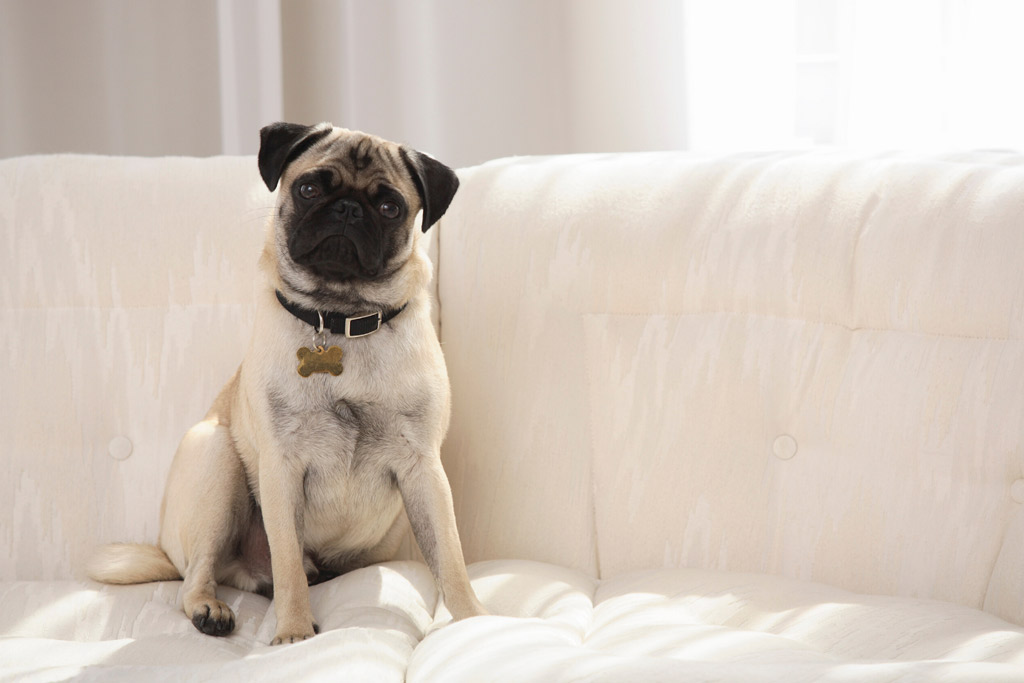
Why Do Pugs Bark?
Having a low tendency to bark doesn’t mean that Pugs aren’t vocal.
Dogs bark as a way to communicate, and they have different barks for different occasions:
#1 – Hello Barking When Happy
Pugs, as good companion dogs, are always happy to greet their owners. Some will also add a “hello bark” to the welcome mix.
Some Pugs will bark out of excitement, whereas others will let out a cry or yelp that sounds like a sharp “yip.”
Again, this will depend on your dog’s personality. Some will stay quiet and cover you with kisses as soon as they can get hold of you!
#2 – Playful Barking When Excited
Similar to the hello barking when happy and excited, Pugs can also bark during playtime.
Your pooch could bark out of anticipation just before you go for a walk or you bring out his favourite toy!
#3 – Attention Seeking Barking When Bored
Pugs are attention seekers. They beg for food, they nudge you for attention (Tootsie was an expert at both!)… This what I call “look at me barking.”
And they can get frustrated if they don’t get what they want! Some bark, others will snort or grunt.
Do you have an attention seeker in the family?
Insider Tip: The more you reward this behaviour by giving your dog what they seek (any form of attention will do… especially shouting back at them to shut up), the more likely they’ll be to continue to bark for attention.
That being said, make sure your Pug is getting enough mental and physical stimulation to prevent boredom. Daily walks, a tug game and short training sessions are a great way to challenge your pooch and keep him entertained.
If your Pug is bored and barks, make sure that you are putting some time aside to spend with your furry friend. 🙂
#4 – Territorial Barking When Protecting
Pugs can bark to let you know that someone is at the door or if there’s a stranger.
However, if your dog hasn’t been socialized, he can bark when someone enters your space (or what he considers his territory).
There’s a difference between a warning bark like someone is at the door and constant barking because a visitor is not welcomed in the house.
Pugs are not considered guard dogs due to their friendly nature, but they can be very protective of their owners.
#5 – Communal Barking When Socializing
If your dog answers when he hears other dogs barking, it’s usually a social response. When your pooch hears the barking of nearby dogs or even dogs at some distance, he can respond in kind.
This depends on your dog’s personality. If you have more than one dog, your Pug could also follow your other dog’s behaviour, i.e., he might choose to bark if he hears your second dog barking.
As I mentioned earlier, the only time I heard Tootsie bark was when she was replying to the neighbour’s dog bark.
#6 – Distress Barking When in Fear
Dogs bark more in a stressful situation. Depending on how socialized they are, the dog might react to certain household sounds like the vacuum cleaner and the lawnmower.
If your Pug hears an unexpected sound, his body will probably go stiff and he may lunge forward a bit with each bark.
Pugs that are familiar with household noises from puppyhood and young age (because you expose them to those and show him that it’s okay) will not bark. Socialized dogs have a higher tolerance to new experiences and tend to be less fearful.
So, meeting strangers during walks, other dogs or pets, and sounds shouldn’t trigger barking in your dog. If it does, then you could help your dog get familiar with those situations to build his confidence.
#7 – Constant Barking When Obsessed
Since Pugs are not big barkers, obsessive barking is not common for this breed.
But, if your dog barks repetitively, perhaps while performing a repetitive movement like running back and forth along the fence in your yard, he’s demonstrating a bit of an obsession.
Don’t confuse excessive barking (“barking at everything”) with “barking at nothing.”
Dogs always bark at something. Just because we humans cannot see it or hear it, it doesn’t mean it’s nothing.
Dogs have a much better hearing sense than we do, so they hear things we can’t. This is why we may think that they are barking at nothing.
Also, dogs can find high pitch noises annoying. You might have exposed your Pug to environmental noises, but he still might not like the kettle, sirens, trains, doorbells, loud music, etc.
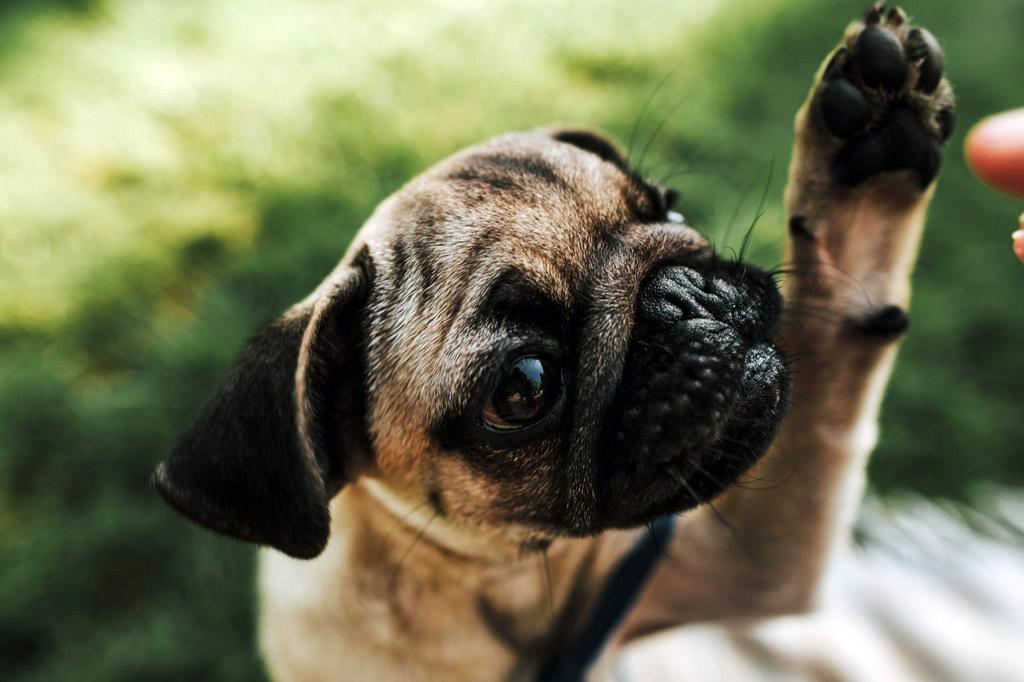
Are Pugs Noisy? What Other Noises Do They Make?
Due to their short noses and shape of their muzzles (characteristic of the brachycephalic breed), Pugs can make all kinds of noises while awake and asleep. These noises include squeaking, grunting, snorting, and snoring.
Brachycephalic is a term that describes the short-muzzle and flattened face of a dog; “brachy” means shortened and “cephalic” means head. The cause is genetic mutations that change the way the bones in the skull grow, resulting in a shorter, wider skull shape.
Those short muzzles can also cause them to take in a lot of air, which can mean a lot of gas. Yes, they are big on farts too!
Although Pugs are quiet in terms of barking, they can be noisy with all those little noises that they make. You will literally hear your Pug breath, snort or grunt on a regular basis!
And don’t let me get started on the snoring! I was used to my Boxer snoring loud, thinking that’s because he was a big dog, but I was shocked when Tootsie, such a small furry ball, snored even as loud. I have to say that I found it quite funny and she didn’t disturb me, but it is something to consider before getting a Pug.
However, what I found scary was the reverse sneezing.
Reverse Sneezing
Pugs are prone to reverse sneezing. This is different from the regular sneezing, which dogs do, just like humans.
Reverse sneezing is more common in dogs with short muzzles and elongated soft palates, such as Pugs and Boston Terriers.
It occurs when your dog’s soft palate gets irritated and causes a throat spasm, which can be rapid or prolonged inspirations that sound like snorts. During the reverse sneeze episode, the airway narrows making it hard for your dog to breathe.
These spams leave dog parents frantic and helpless, myself included. However, there’s no cause for panic since reverse sneezing spasms are often over quickly with no lasting ill effects.
Insider Tip: To help your Pug during these spasms, you can gently stroke his throat in a downward motion to encourage him to swallow. Some dog parents also suggest covering the dog’s nostrils with your fingers for a few seconds, but I personally never tried this before.
Remember, the calmer you remain, the calmer your Pug is likely to be. Dogs catch on our mood easily, so keeping your cool (even if this is difficult) helps your pooch!
Of course, if reverse sneezing becomes a chronic problem rather than an occasional occurrence, you should consult your vet.
Screaming
There are certain sounds or noises that we can distinguish and understand as “normal” or common from dogs: barking, whining, howling and even crying/whimpering.
However, hearing a pug being vocal in a way that can only be described as screaming, can come as a surprise, shock, or perhaps funny (depending on the situation!)
Pug screaming is described that way because of their prolonged, high-pitched sound that could even be described as a shriek, and their behaviour and facial expression during the situation. You’ve either witnessed this yourself or maybe watched a video (there are a lot of them around!), which may have left you curious or worried about this:
Why do pugs scream?
Apart from physical pain, pug screaming is a situational response that your dog uses to communicate or show that they want something, like food or play, OR that they’re feeling a certain way: from over-excitement, anxiety (e.g. separation anxiety – when you’re leaving the house without your dog), attention, hyperactivity or reactivity.
Although this can be seen as a quirky behaviour, and for some embarrassing, this screaming vocalization is not uncommon for the pug breed. If this is something that you’re especially concerned about, you can:
- Check that your pug is in a healthy condition, and isn’t experiencing pain from injury or otherwise. Pay a visit to your vet if this is a concern or if you’re unsure.
- Pay attention to when this tends to happen, to understand why.
- Decide if you’re comfortable with your pug’s screaming behaviour (is it acceptable or good behaviour in your books?), and take further action – usually training.
Read also: Can Pugs Be Left Alone? 13 Tips To Make It Easier – for training your pug dog, especially for separation anxiety.
